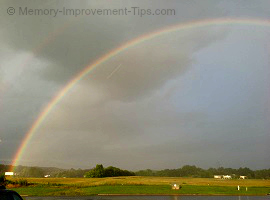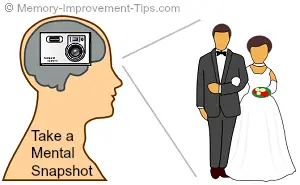- Home
- Better Memory
- Memory Systems
- Mental Snapshots
Mental Snapshots: A Simple Trick for Remembering Events
Never want to forget that gorgeous rainbow, beautiful sunset, or special event? Using your eyes and brain like a camera, consciously take mental snapshots while it's happening.
By engaging your full concentration on the present moment, this technique encourages the formation of clearer, stronger memories of important scenes.
My ability to remember the details of events is not strong naturally. But I've had great success creating long-lasting memories of such events by taking mental snapshots. Some of the clearest images in my memory were created using this technique.
So if you hate your lousy episodic memory, don't despair. Instead, from now on resolve to snap a mental photograph or two during events you want to increase your odds of remembering.

A double rainbow I saw recently
Assembling a photo album, recording a video of the event, or describing it in a journal entry are important ways to preserve memories. But physical memory aids aren't meant to be carried around everywhere. A clear image in memory, instantly recalled, is obviously precious.
The memory of events is called "episodic" memory, one type of declarative memory as recognized by cognitive neuroscience. (The other is semantic memory, the recollection of general concepts and knowledge.)
Your episodic memory includes memories of places, times, and emotions associated with events that have happened during your life. When you recall your graduation ceremony or what you had for breakfast this morning, that's your episodic memory.
Some people recall the details of events easily. Whether it's last year's vacation, or a recent business meeting, or a rainbow seen during childhood, mental images of these episodes stick in their brain.
"You should always be taking pictures, if not with a camera then with your mind. Memories you capture on purpose are always more vivid than the ones you pick up by accident."
- Isaac Marion, Warm Bodies
And, especially frustrating to the rest of us, they seem to recall these memories effortlessly.
There are even documented cases of perfect episodic memory, a condition known as hyperthymesia or "excessive remembering". It's not necessarily a good thing.
Jill Price, a well-known hyperthymesic, can recall every day of her life since age 14. She describes it as a non-stop, uncontrollable, exhausting burden. No doubt quite distracting.
But if you find yourself often shamefacedly admitting, "I don't remember that," about events, this clever memory trick may be for you. Taking mental snapshots doesn't require special tools. Just your eyes, brain, an intention to concentrate, and a couple steps that mimic the use of a camera.
How to Take a Mental Snapshot
The secret to creating a vivid snapshot image that results in a clear episodic memory is attention. One cause of poorly formed memories is not concentrating intently and specifically enough on what's happening.
You are at the event. You're soaking in the general situation. But, perhaps without realizing it, you are not connecting deeply enough with the important and special moments. To create an episodic memory, you need to zoom in on those representative moments.
For example, suppose you're attending a friend's wedding, and you want to forever remember the moment they take their vows. During the special moment, concentrate intently on the happy couple, and take a mental photo.
To take this snapshot, follow the same steps as taking a real picture, using your eyelids as the camera's "shutter".
Gaze intently at the scene. Hold your head still. Look at the scene with great focus and concentration. Tell yourself firmly it's important to remember the details of this exact situation.
Carefully observe the colors in the scene. The arrangement and positions of the wedding party. The dresses worn by the bridesmaids. The lighting in the room, the smell of the flowers. Really drink it in, consciously.
Blink your eyes slowly. With your eyes locked intently on the scene, click your brain's camera "shutter" by blinking your eyes once at half speed. In other words, close and open your eyes at half the speed of a normal blink. Imagine hearing the "click" of a camera shutter as you do this.
Now review the scene in your mind's eye. Close your eyes for a few moments, and conjure up the image in your memory. Take a mental look at what you've captured.
If your mental picture is fuzzy, open your eyes for a renewed, harder look at the scene. Take another mental snapshot with even more intensity.
A Strong Mental Impression Is the Key
Intense focus is the key to creating clear and permanent mental snapshots. That requires mental effort. The more you practice this memory technique, the clearer, more detailed, and more permanent these mental images will become.
Don't take dozens of snapshots at a time. Instead, invest maxium concentration in a few specific moments that represent the event. For a spectacular sunrise, a single mental snapshot might be enough.
Creating mental snapshots is easier for those who visualize well, either naturally or who have developed the ability through practice. The only way to find out whether it can work for you is to try it.
If you think about it, your most lucid memories are probably associated with a powerful emotion. Events linked to peak moments of joy, accomplishment, fear, or loss are usually recalled vividly without effort.
And you naturally can recall many other events from your life with more or less fidelity, of course.
But to increase your chances of forming an exceptionally clear memory of a particular event, take a few mental snapshots during important scenes.
Because this technique forces you to focus your attention intently on the moment, you may discover that many moments burned into your memory this way are recalled easily later.
Published: 07/16/2014
Last Updated: 06/11/2020

Newest / Popular
Multiplayer
Board Games
Card & Tile
Concentration
Math / Memory
Puzzles A-M
Puzzles N-Z
Time Mgmt
Word Games
- Retro Flash -
Also:
Bubble Pop
• Solitaire
• Tetris
Checkers
• Mahjong Tiles
•Typing
No sign-up or log-in needed. Just go to a game page and start playing! ![]()
Free Printable Puzzles:
Sudoku • Crosswords • Word Search









